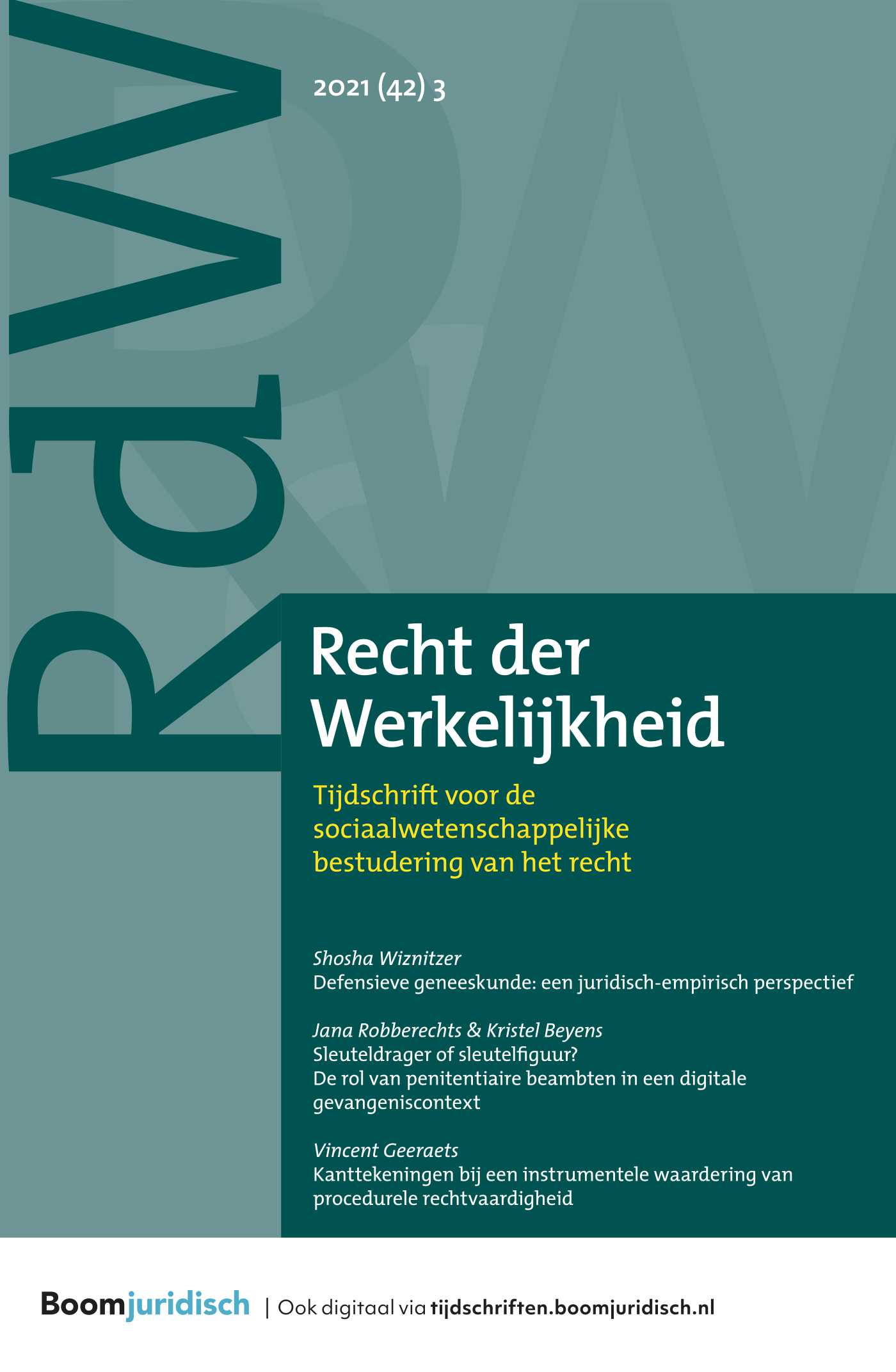|
This research addresses the question whether there is social inequality in the impact of justiciable problems, and whether this unequal impact is itself a factor in the emergence of new problems. The study examines whether citizens in vulnerable circumstances are more likely to experience negative side effects – such as stress, sleep and health issues – of a justiciable problem than those in less vulnerable circumstances. And in turn whether these negative side effects increase the chance of new justiciable problems. |


Recht der Werkelijkheid
Meer op het gebied van Algemeen
Over dit tijdschriftMeld u zich hier aan voor de attendering op dit tijdschrift zodat u direct een mail ontvangt als er een nieuw digitaal nummer is verschenen en u de artikelen online kunt lezen.
| Redactioneel |
Een pleidooi voor empirisch zelfonderzoek naar de staat van de juridische professie en het juridisch onderwijs |
| Auteurs | Willem-Jan Kortleven |
| Auteursinformatie |
| Artikel |
|
| Trefwoorden | Justiciable problems, Paths to justice, Vulnerability, Social inequality, Legal capability |
| Auteurs | Myrte Hoekstra en Marijke ter Voert |
| SamenvattingAuteursinformatie |
| Artikel |
|
| Trefwoorden | Personalized public services, Social Support Act (Wmo 2015), Narrative policy analysis, Empty signifier, Changing welfare state |
| Auteurs | Eline Marie Linthorst en Lieke Oldenhof |
| SamenvattingAuteursinformatie |
|
In this article we study the policy ideal of providing personalized public services which has gained considerable ground in recent years: both in the Netherlands and abroad. |
| Artikel |
De kans op een VOG en ruimte voor maatwerk in (hoger) beroep aan de hand van een systematische jurisprudentieanalyse |
| Trefwoorden | Criminal record screening, Certificate of Conduct, Collateral consequences, Risk assessment, Systematic case law analysis |
| Auteurs | Elina van ’t Zand en Chantal van den Berg |
| SamenvattingAuteursinformatie |
|
The Netherlands endorses a unique criminal record system in which every job applicant can request the government to provide a risk assessment determining whether he or she is fit for a given job, known as the Certificate of Conduct (CoC). Yet, little is known about how these state-conducted risk and assessments are made. To fill this gap, we systematically analysed all case law on CoCs published online since 2004. We found surprisingly low chances of successfully winning a CoC by appealing against its denial (1.6%). Moreover, although judges have ample room for discretion and individualised assessment, only exceptional personal circumstances may lead to a reversal of the denial. In particular, cases with only one offence committed a long time ago or involving a professional assessment stating a low recidivism risk. These findings indicate a strong focus on risk prevention, oftentimes favouring public protection above the individual’s rehabilitation and socio-economic interests. This puts due process at stake, especially since very few applicants (0.6%) appeal the denial of a CoC. |
| Forum |
Recht, wat is dat eigenlijk? Over de toeslagenaffaire en andere buikpijndossiers |
| Auteurs | Lukas van den Berge |
| Auteursinformatie |
| Forum |
Waar moet de Rechtspraak met haar buikpijn naartoe? |
| Auteurs | Bert Marseille |
| Auteursinformatie |
| Recensies en signalementen |
Procedurele rechtvaardigheid doet er altijd toe. Of toch niet? |
| Auteurs | Marc Wever |
| Auteursinformatie |
| Werk in uitvoering |
Reguleren met de meldingsplicht |
| Trefwoorden | Meldingsplicht, Bestuursrecht, Deregulering, Vergunningsplicht |
| Auteurs | Wybrand van der Meulen |
| SamenvattingAuteursinformatie |
|
The obligation to notify is a legal instrument, which aims to reduce unnecessary regulatory pressure for civilians and companies. Developed as an alternative to regulation by permit, it merely obliges anyone to notify the administrative authority when planning a specific activity that brings little hazard to the public interest. The notice informs the administrative authority about the planned activity, so it can supervise whether it is conducted in accordance with the general rules and can enforce these rules if necessary. Hence, supervision is assured, without people having to deal with a time consuming and labour intensive permit procedure. |

